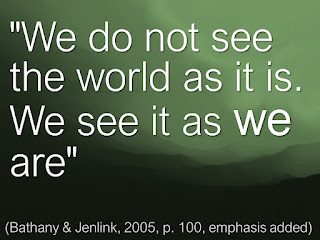So a philosophy, perhaps, but with a sense of travel. Sarmento talks about this as "a global journey, a circumnavigation powered by the speed of new technologies [...] underwrit[ten by interculturalism] comings and goings, the transmission and reception of information that are implicit in the communication, in the diversity, and in the transit that the prefix inter suggests" (2014, p. 603). If brave, and open to making new mistakes, we "travel the world and the seven seas" because we are "looking for something" (Lennox & Stewart, 1983). And why not!
We need to gee ourselves up to "cross the first great border to intercultural transit – the frontier created by the concept of culture itself – avoiding the commonplace notion of the intercultural as simply us versus them" (Sarmento, 2014, p. 604). Avoiding assumed dichotomies helps us in this work: considering the collective, and allowing everyone a voice in the process... and listening to all those voices (Fisher-Borne et al., 2014; Sarmento, 2014).
We need to accept that there is much we do not know, and to take a beginner role (read more here) in an intercultural process. We have an open mind, and approach interculturalism with cultural humility, if you will (Fisher-Borne et al., 2014). This fits well with Māori tikanga: where Manāki can be defined "as bestowing the blessing that mana represents in the love, care, respect and kindness expressed towards an individual or group of people" (Walters, 2015, p. 1)
One interesting quote I came across while writing this piece was that "We do not see the world as it is. We see it as we are" (Bathany & Jenlink, 2005, p. 100, emphasis added)*. Powerful! Our biases can shape our world view, despite our willingness to let our 'travel' broaden our minds. Being awake to what may blind us - literally being woke, rather than as a pejorative - is what helps us to think interculturally, which then helps us to see new ways to apply truly meaningful DEI programmes in our workplaces.
Sam
References:
Bathany, A., & Jenlink, P. M. (Eds.) (2005). Dialogue as a Means of Collective Communication. Springer Science + Business Media, Inc.
Fisher-Borne, M., Cain, J., & Martin, S. (2014). From mastery to accountability: Cultural humility as an alternative to cultural competence. Social Work Education, 34(2), 165–181. http://doi.org/10.1080/02615479.2014.977244
Karakhan, A. A., Gambatese, J. A., Simmons, D. R., & Al-Bayati, A. J. (2021). Identifying pertinent indicators for assessing and fostering diversity, equity, and inclusion of the construction workforce. Journal of Management in Engineering, 37(2), 04020114. https://doi.org/10.1061/(ASCE)ME.1943-5479.0000885
Lennox, A. Stewart, D. A. (1983). Sweet Dreams (Are Made of This) [Recorded by Eurythmics, 12" single]. UK; RCA.
Sarmento, C. (2014). Interculturalism, multiculturalism, and intercultural studies: Questioning definitions and repositioning strategies. Intercultural Pragmatics, 11(4), 603-618. https://doi.org/10.1515/ip-2014-0026
Walters, T. (2015). Cultural humility: A hermeneutic literature review. [Masters Thesis, Massey University]. https://openrepository.aut.ac.nz/server/api/core/bitstreams/3620c459-44e5-428d-811c-2d860e091ea1/content
* This quote was attributed to Anais Nin. However, as I was unable to find a Nin source, I have attributed it to where I found it published (i.e. Bathany & Jenlink).


No comments :
Post a Comment
Thanks for your feedback. The elves will post it shortly.